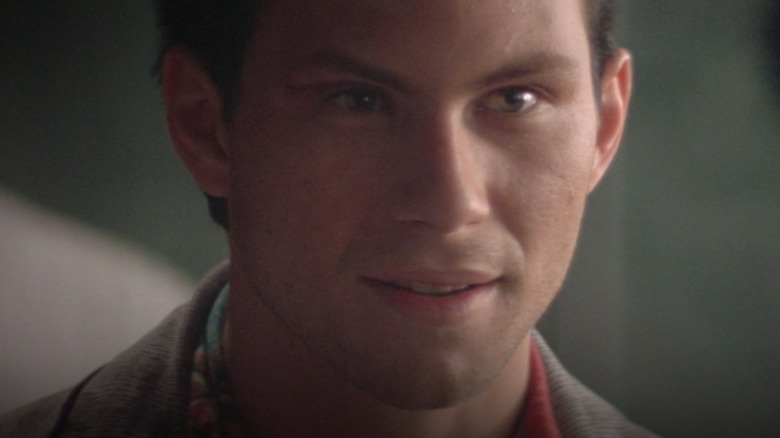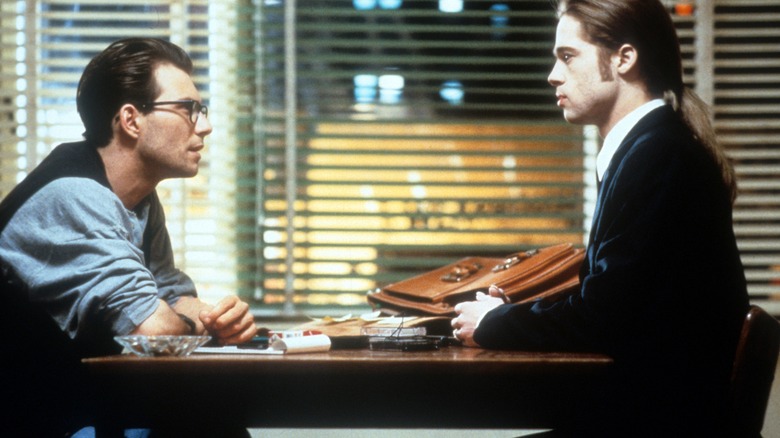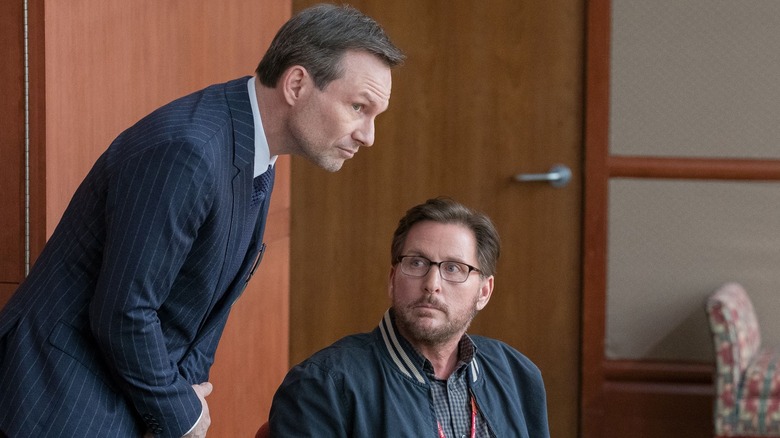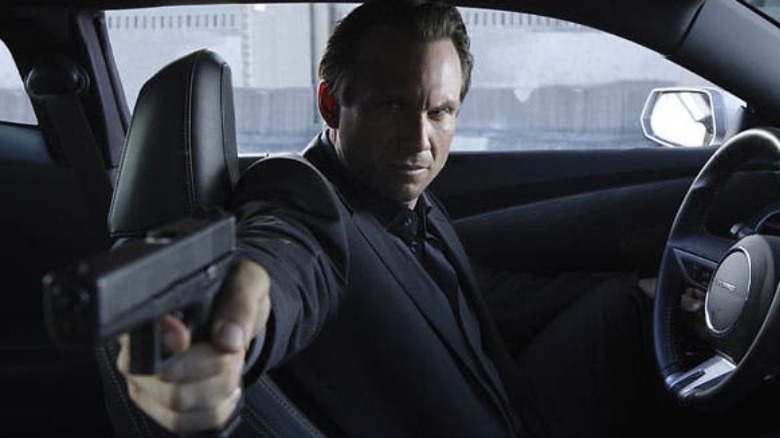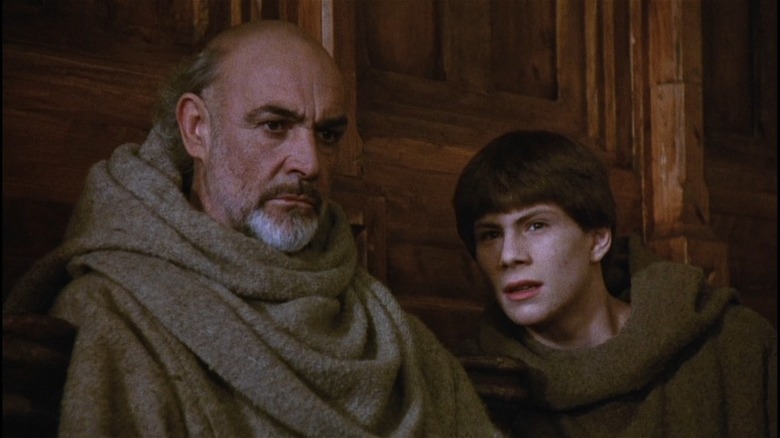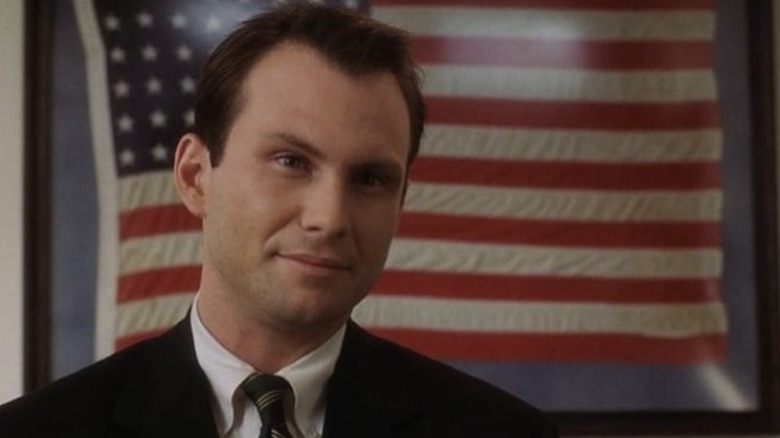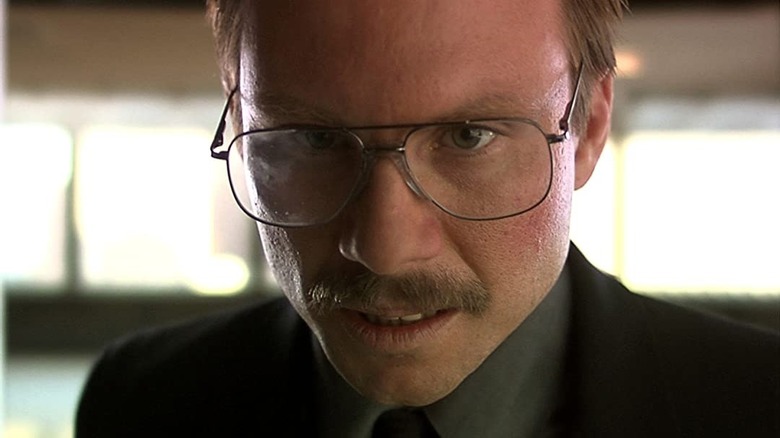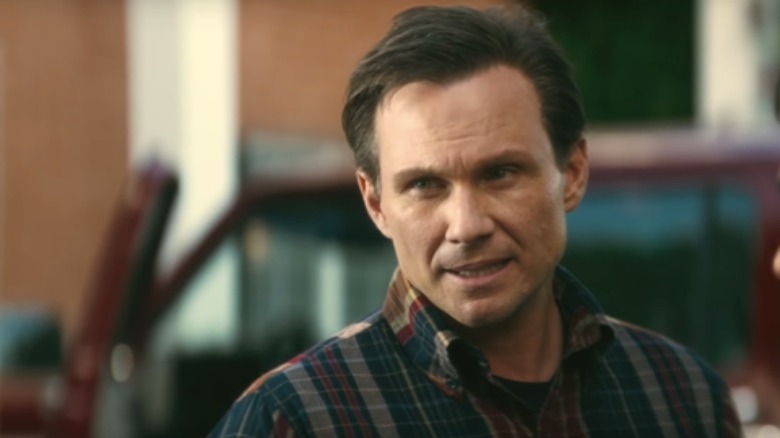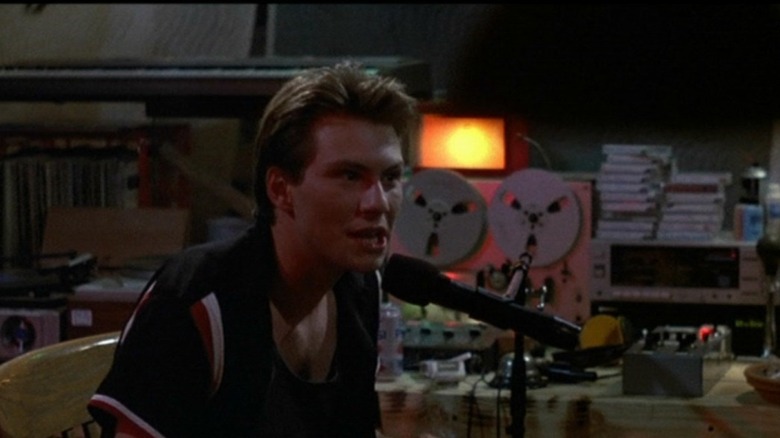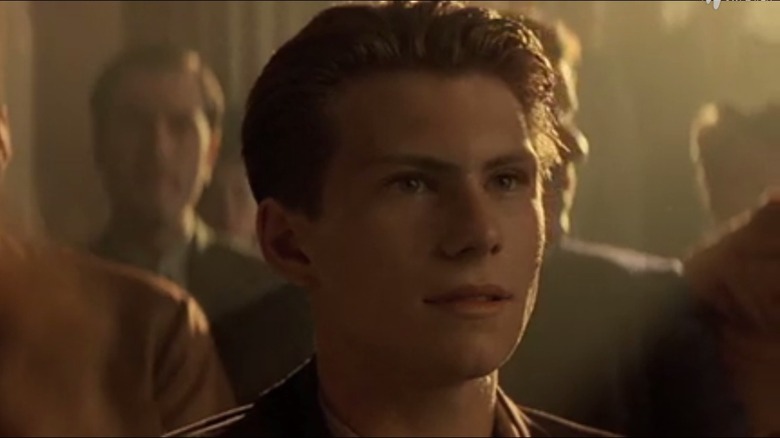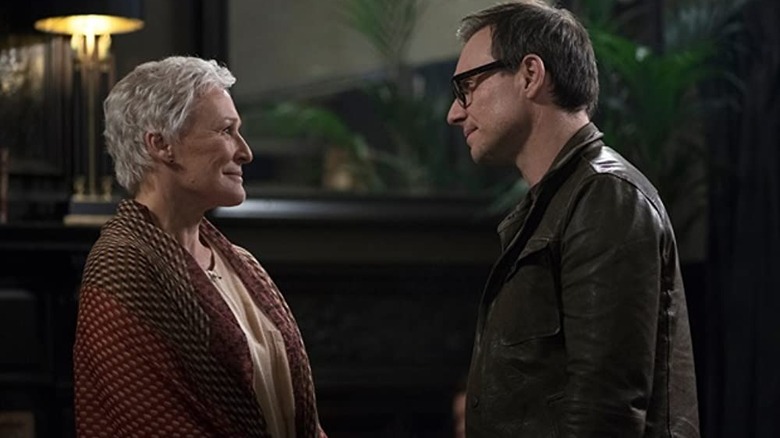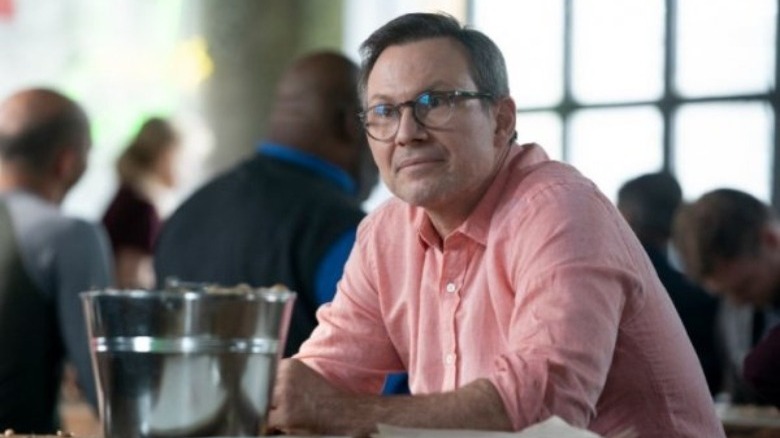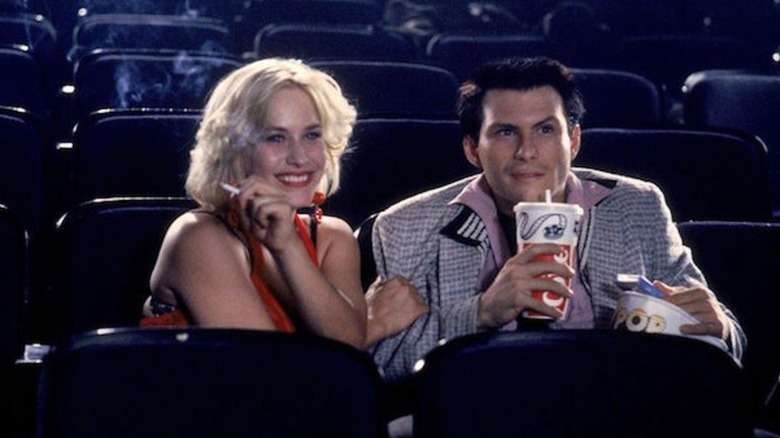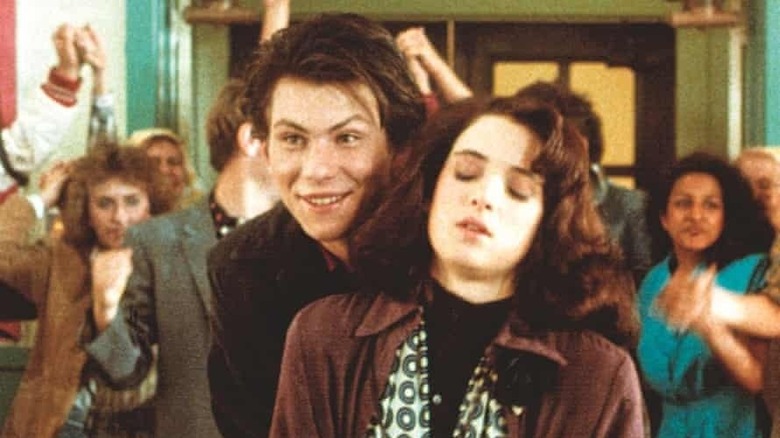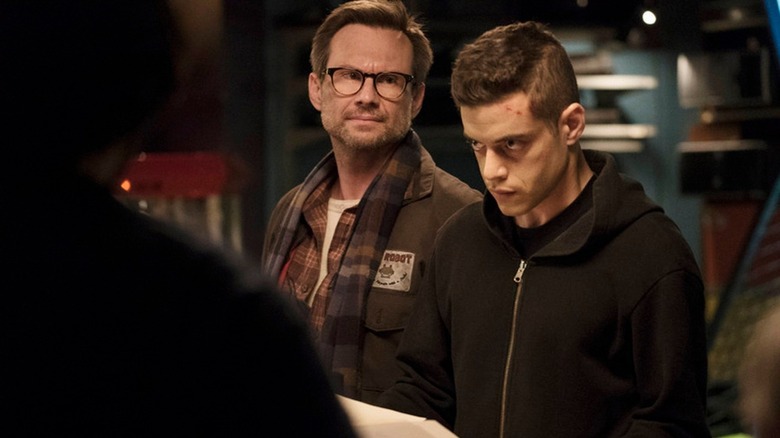Christian Slater's Best Onscreen Performances
In the '90s, Christian Slater was on track to become one of the leading men to beat. His first taste of the big screen came when he played the young brother of the titular hero in 1985's "The Legend of Billie Jean." After the 1989 cult black comedy "Heathers," the actor who all the critics were comparing to a young Jack Nicholson started getting parts in higher-profile films, like the 1990 western sequel "Young Guns II" and the 1991 big-budget adventure film "Robin Hood: Prince of Thieves."
In part because of difficult times in Slater's life when, as recounted by the Guardian, he was acting a little too much like his more self-destructive characters than anyone would like, Slater's star began to fall in the late '90s, but he never left the spotlight entirely. Among other things, Slater began doing more work on television, which eventually led to some of his most celebrated roles.
From homicidal high schoolers to anarchist hackers, here are Christian Slater's best onscreen performances.
Interview with the Vampire
Christian Slater's Daniel Molloy isn't a major character in "Interview with the Vampire." Based on the 1976 novel of the same name, the story is told mostly from the point of view of Louis (Brad Pitt), as he recounts the story of his long life to Molloy. We learn of Louis being turned into a vampire by Lestat (Tom Cruise), his long and strange relationship with the young Claudia (Kirsten Dunst), and the tragic turn of events in Paris when he encounters Armand (Antonio Banderas). In spite of the pain, Louis relates to Molloy, and toward the end of the film, he still begs to be made immortal.
Because of tragic circumstances, taking the role of Molloy wasn't easy for Slater. The film includes a dedication to the late River Phoenix after the end credits because, as ScreenRant points out, Phoenix was originally cast in the role before his fatal drug overdose in 1993. Speaking to Yahoo News in 2018 about accepting the role, Slater said, "It was awkward. It was uncomfortable. It was hard." He added that he donated his salary from "Interview" to charities Phoenix had been involved with, which made him feel like accepting the role "was more in honor of" Phoenix.
The Public
With a killer cold front on the way and Cincinnati's emergency shelters filled to capacity, Jackson (Michael Kenneth Williams) leads a group of homeless people who refuse to leave the downtown library when it closes. The situation quickly deteriorates and soon the only people standing between the riot police and the homeless just trying to keep warm are the librarian Stuart Goodson (Emilio Estevez), a crisis negotiator (Alec Baldwin), and politically ambitious district attorney Josh Davis (Christian Slater).
Written by, directed by, and starring Emilio Estevez, the 2018 social advocacy drama "The Public" isn't without its flaws. Many critics agreed with RogerEbert.com's Nell Minow that while the film's goals are admirable, it comes off as far too preachy and deals with the complex issues presented in far too simplistic a manner. However, "The Public" still manages to be an engaging film, in large part because of a stellar ensemble cast. Along with Slater and the other actors already mentioned, Estevez also brings Jena Malone, Jeffrey Wright, and Gabrielle Union along for the ride.
My Own Worst Enemy
We've seen films and TV shows before in which secret agents lead double lives: being nearly superhuman operatives in their work, while in their private lives fooling their family and friends into thinking they're just run-of-the-mill office drones. Well, what if the more humdrum alias wasn't even aware the killer secret agent existed until both lives suddenly came crashing together? That's the premise of the short-lived NBC drama "My Own Worst Enemy."
Christian Slater plays the roles of Henry Spivey and Edward Albright. Spivey is an efficiency expert who lives in the suburbs and acts as a cover for Albright, the dangerous secret agent. Because of a chip in Albright's head allowing his handlers to switch between their personalities, the more mundane Spivey has no knowledge of Albright until the chip malfunctions — causing Spivey and Albright to switch places at random, putting them both in situations neither knows how to handle.
Unfortunately, in spite of largely positive reviews praising Slater's performance and comparing the show to films like "Memento" and "Mr. and Mrs. Smith," NBC canceled "My Own Worst Enemy" after only four episodes had aired. Its ninth episode was its last, ending on a cliffhanger.
The Name of the Rose
A year after his feature film debut in "The Legend of Billie Jean," Christian Slater got the chance to work with some of the best actors Hollywood had to offer in just about the last role you would expect him to pick. Slater plays a young Franciscan monk — the sidekick to William of Baskerville (Sean Connery) — in the 1986 historical drama/murder mystery, "The Name of the Rose."
Based on the 1980 novel by Umberto Eco, "The Name of the Rose" is set in the 14th century at an abbey in Italy where William and his protégé, Adso of Melk (Slater), are tasked with unraveling the mystery of a dead monk. While it doesn't take long for William to figure out the dead monk took his own life, soon a second victim is found. Fears of demonic involvement are stoked, and eventually the very last thing William wants happens — Inquisitor Bernardo Gui (F. Murray Abraham), one of the Catholic Church's infamous Inquisitors, is dispatched to make things more complicated than they already are.
While it wouldn't be fair to say Slater's role in "The Name of the Rose" is minor, admittedly this isn't his moment to shine. He still delivers a great early performance, but the best reason to watch the film is the wonderful, fiery tension between Connery and Abraham.
The Contender
In 2020, Americans elected a woman to the office of Vice President, but two decades earlier the idea was still a hard sell to far too many. Examining this, as well as responding to the Monica Lewinsky scandal, was 2000's "The Contender." Joan Allen stars as Senator Laine Hanson, who is nominated to the vice presidency by President Jackson Evans (Jeff Bridges) after the unexpected death of his VP. Standing between Hanson and her appointment to Executive office is a confirmation process led by Republican Representative Shelly Runyon (Gary Oldman), who has absolutely no intention of allowing Hanson's ascension if he can stop it.
That's where Christian Slater's Representative Reginald Webster comes into the story. The principled junior Democratic congressman convinces Runyon to allow him on the committee to confirm Hanson, because he doesn't trust Hanson for switching parties from Republican to Democrat. In spite of his party affiliation, Webster proves to be a loyal attack dog for Runyon in the hearings that follow, until he starts to see the proceedings for what they are. After Runyon uses every dirty trick in the book to drag Hanson's name through the mud, Webster finally realizes his principles are being weaponized for Runyon's vendetta.
He Was a Quiet Man
In 2007, Christian Slater performed one of his most commanding and engaging leading film roles in years. "He Was a Quiet Man" begins feeling something like 1993's "Falling Down," with Bob Maconel (Slater) planning to kill as many of his corporate co-workers as he can manage, and eventually himself. But when the unbelievable happens, Maconel ends up saving his co-workers' lives rather than taking them. Things only get weirder after Maconel, now seen as a hero in his office, gets physical with the same secretary (Elisha Cuthbert) he's been fixated on for years and gets promoted by his boss (William H. Macy).
Most critics seem to agree while "He Was a Quiet Man" has its problems — like Kaleem Aftab, who writes that the director's penchant for constant surprises "leaves this flawed but interesting film punch drunk and wobbly" — that Slater delivers one his strongest performances ever in the surreal black comedy.
If you or anyone you know is having suicidal thoughts, please call the National Suicide Prevention Lifeline at 1-800-273-TALK (8255)
Dirty John
Based on the popular podcast of the same name, "Dirty John" is a true-crime anthology TV series and so offers completely different stories and casts from season to season. For the show's second season, Christian Slater stars as lawyer Dan Broderick who — we learn in the first episode — will not survive the series.
The season is based on the real-life story of the murders of Dan Broderick and his wife Linda Kolkena in 1989 at the hands of Dan's ex-wife, Betty Broderick. With Dan's ending announced in the premiere episode, the rest of the story is no whodunnit, but rather a chronicling of what leads to the murders. With flashbacks to the early days when Dan and Betty were high school sweethearts, we follow them through their marriage, their bitter divorce, and the inevitable tragedy. Slater delivers a great performance as Dan Broderick, and the story does a good job of framing him as a bad husband who nevertheless did not deserve his grisly fate.
Pump Up the Volume
In an age when anyone with a mobile phone has the potential to connect with millions on a whim, it may seem impossible that there was a time when getting your voice heard by anyone out of immediate earshot took quite a lot of doing. In the case of Christian Slater's character Mark Hunter in 1990's "Pump Up the Volume," it literally means breaking the law.
Calling himself Hard Harry, Mark broadcasts a pirate radio show from his parent's basement in a Phoenix suburb. At first, the administration of Hubert Humphrey High knows little about him, the lewd jokes he makes, or the music he broadcasts — much of which is so off the beaten path that MTV wouldn't have played it even back when they played music videos. But things change when Hard Harry starts making real trouble, like calling a guidance counselor on the air and exposing him for getting a student expelled because she was pregnant.
"Pump Up the Volume" was one of the signature cult films of Generation X, and one of Slater's first films to feel like something with true thematic weight.
Tucker: The Man and His Dream
The 1988 biopic "Tucker: The Man and His Dream" tells the real-life story of Preston Tucker's battles against an automobile industry more concerned with holding on to what it has than considering the future. Jeff Bridges' Preston Tucker is an impatient inventor who has no problem thumbing his nose at authority, even once leading the police on a chase just for fun.
Ultimately, "Tucker" is a tragedy, as the hero's dreams are dashed before they can make too much headway. But rather than wallow in doom and gloom, the story celebrates Tucker's optimism, determination, and innovation in the face of unbeatable odds.
As Preston Tucker's son Preston, Jr., Christian Slater's role in the film is relatively minor. Still, released the same year as "Heathers" and directed by Francis Ford Coppola, "Tucker" was an important step on the actor's journey to bigger and better things.
The Wife
In "The Wife" Christian Slater once again — as he did in "Interview with the Vampire" — plays a journalist looking to uncover a truth few know about. But rather than looking for eternal life, this time his character seeks out the more mundane truth about two people — a Nobel–winning author and the woman who did all the writing.
Joan (Glenn Close) falls head over heels for her professor, Joseph Castleman (Jonathan Pryce), and soon the professor is fired for his affair with his student. When Castleman tries to write a novel, Joan rewrites it for him and it becomes a bestseller. They eventually marry and Joseph — true to his nature — is serially unfaithful to Joan, though she continues to ghost-write all of his novels for him.
Things come to a head between Joan and Joseph when they travel to Stockholm for Joseph to accept his prize. Biographer Nathaniel Bone (Slater) comes into the picture, claiming to know exactly who wrote all of Joseph's novels. Along with other great moments, Slater and Close have a wonderful scene together when Bone invites Joan out for drinks in hopes of drawing the truth out of her.
Dr. Death
The notion of a television adaptation of a true-crime podcast is a fairly new one, yet Christian Slater has found his way into two of them. The year after he starred in Season 2 of "Dirty John," he played one of the heroic doctors who fight to bring the monstrous Dr. Christopher Duntsch (Joshua Jackson) to justice in Peacock's original miniseries "Dr. Death."
Between 2011 and 2013, the real Dr. Christopher Duntsch maimed or killed nearly 40 of his patients. Despite a history of causing serious injury in what should have been relatively simple procedures, Duntsch continued to operate on helpless patients for far too long. "Dr. Death" shows us how the Duntsch was able to continue in spite of whistleblowers and a growing pile of bodies. The beginning of the end comes when neurosurgeon Robert Henderson (Alec Baldwin) and vascular surgeon Randall Kirby (Christian Slater) unite to cut Dunstch's carnage short. The pair have a fun good cop/bad cop feel, with Henderson being the more seasoned and diplomatic of the pair, while Kirby's character is perfect for Slater's strengths — playing the more fiery crusader who wants justice done, regardless of the consequences.
True Romance
In 1993's "True Romance," Christian Slater stars as comic book shop employee Clarence, opposite Patricia Arquette as a call girl named Alabama. After a night of kung-fu flicks and lovemaking, the pair elopes. Clarence stumbles upon a suitcase full of uncut cocaine after killing Alabama's old pimp (Gary Oldman). They head out west to sell the coke, not knowing the mob is on their tail and that there's even more danger waiting for them in California.
Decades later, "True Romance" remains too good of a secret. Written by Quentin Tarantino, all of the filmmaker's trademark dialogue is there, along with more pop culture references than could fill a Funko collection. The film boasts a deceptively star-studded cast, including utterly unforgettable performances by Oldman, Christopher Walken, and Dennis Hopper. Brad Pitt appears in one of his least-involved roles as Floyd, a stoner who does little more than hang out on his couch and field the growing line of mobsters arriving to look for Clarence. Tarantino mainstay Samuel L. Jackson appears ever so briefly. After watching James Gandolfini's brutal confrontation with Alabama, it's easy to see why the actor was later cast as Tony Soprano.
Even Val Kilmer appears, though he's easy to miss because you never get a clear shot of his face. Listed in the credits simply as "Mentor," Kilmer plays the ghost of Elvis, who gives Clarence advice whenever he's in the bathroom, like how to kiss up to movie producers and the wisdom of murdering pimps.
Heathers
Truly coming off like a devilish, young Jack Nicholson, Christian Slater stars as a villain you really don't hate all that much at first in the 1989 black comedy "Heathers." Slater is immensely watchable as the rebellious J.D., who doesn't give an inch to the bullies of his high school, even going so far as bringing a gun to school and firing blanks at them. Wanting to detach herself from the boring popular crowd, Veronica (Winona Ryder) falls for J.D. hard.
Veronica soon learns that J.D. doesn't just stand up to bullies and the popular kids: he murders them. To cover his tracks, J.D. makes his murders look like suicides, leading all the various dead to be held up as martyrs. Not able to stand the killing anymore, Veronica breaks things off with J.D., but is forced to step in when she learns he has a plan to kill everyone in school.
Made a decade before the horrific massacre at Columbine, "Heathers" can't help but come off even darker today than it did when it was released. It's not uncommon to hear someone say that a particular film or TV show couldn't be made today, and there's some truth to it usually in varying degrees. But the notion that a studio would greenlight "Heathers" today is absolutely unthinkable.
If you or anyone you know is having suicidal thoughts, please call the National Suicide Prevention Lifeline at 1-800-273-TALK (8255).
Mr. Robot
One of Christian Slater's most consistently praised projects also happens to be one of the most timely (like his earlier work on "Heathers" and "Pump Up the Volume"). Rami Malek leads as the mentally unwell hacker Elliot in the USA thriller "Mr. Robot," and Slater plays the titular anarchist who recruits Elliot into the group known as "fsociety." Often cited as being one of the most accurate portrayals of hacker culture ever shown on-screen, "Mr. Robot" enjoyed high critical acclaim throughout its four-season run.
Speaking to The Hollywood Reporter in 2015 when the series began, Slater said one of the things that drew him to the role was how mysterious Mr. Robot was. He also expressed shock with how scarily current it proved to be. Slater brought up an episode in which fsociety deals with China's Dark Army hackers, "and then two weeks later," Slater added, "China hacks 4 million federal employees. I was like, 'Oh my God.'"
